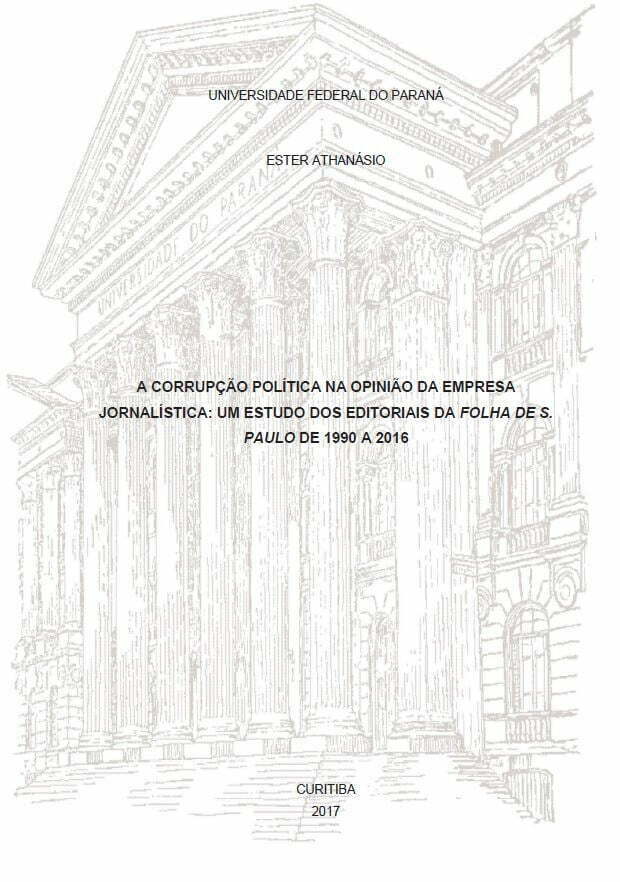
[Abstract]
Editorials are a singular space in which newspapers position themselves through a specific code of textual production, thus evidencing their condition as political actors. However, the literature in the field of Political Journalism allows us to verify that the number of Brazilian studies focused on the systematic analysis of the political discourse contained in such opinionated texts is relatively low. This quantitative-quantitative dissertation investigates the editorial discourse of the Brazilian newspaper Folha de S. Paulo (FSP) on the topic of “corruption” between 1990 and 2016 – a period that corresponds to the first 27 years since the first direct presidential election after the end of the Military Regime (1964-1985). The intention is to examine the path of editorials on this topic and contribute to an understanding of what factors play a role in the production of the editorial genre. There are three hypotheses, summarized in: 1) the discourse of fighting corruption and demanding accountability from those involved is predominant and has become more pronounced as enforcement has strengthened; 2) the discourse varies according to the time and political group accused, and 3) corruption is a continuous theme on the editorial agenda of Folha de S. Paulo, but the frequency of publications increases in line with expressive historical occurrences.
As an illustrative methodological strategy, we adopt (1) a quantitative description concerning the oscillation of the frequency of publications considering the entire volume of editorials in the researched universe (n=850) in order to evaluate if, and to what extent, there is an association between the number of publications and the historical events of the period. In the qualitative stage, we resorted to (2) the Discourse Analysis (DA) of a sample of editorials (n=143), built from the compound year technique, having as unit of analysis the editorials that mention the word “corruption” and, as a complementary methodological strategy, the dissertation resorted to (3) the application of in-depth interviews with editorialists and opinion editors who worked in the newspaper during the analyzed period.
The results found confirm the hypotheses, showing that since 1990 the newspaper has quantitatively increased the presence of the theme “corruption” in its editorials, following the country’s agenda of investigations. Qualitatively, we can see the trajectory of the discourse, and in the 1990s, besides the lower frequency of texts, it was noticed that the newspaper dealt with the theme with a certain fear, considering the relative low volume of accusations and convictions at the time. In the 2000s, mainly because of the Mensalão case, the discourse becomes more intense in volume and degree of combativeness. The newspaper adopts a more aggressive tone and reiterates its concern with the high rates of perceived Brazilian corruption and lack of punishment. In the 2010s, with the trial of the case that dominated the previous decade and the outbreak of Operation Lava Jato, the newspaper begins to consider the issue from a turning point, pointing to punishment – seen in the Mensalão and Lava Jato – as proof that Brazil would live a new moment of confrontation with the problem. It was noted that the evolution of the discourse follows the historical and political context, however, it does not change in its essence. That is, there are assumptions about corruption that prove to be constant over the 27 years analyzed. Although instruments to combat the phenomenon are proposed, the texts do not overcome the barrier of observation and the shallow pointing of possible causes, consequences, and solutions to the problem. It is an automatic discourse, which situates the newspaper in an adversarial perspective to politics, disqualifying it while articulating the credibility and public image of the newspaper and the journalistic field itself.
Keywords: Journalism. Editorials. Corruption. Folha de S. Paulo. Speech.
Publication Year: 2017
Student: Ester Athanasio
Advisor: Prof. Dr. Paulo Jamil Almeida Marques
University: Federal University of Parana
More information: https://acervodigital.ufpr.br/handle/1884/57489






